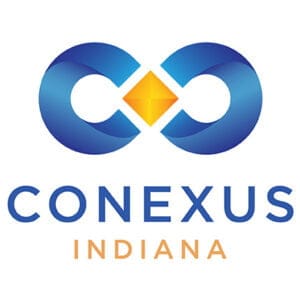
As the state of Indiana continues to strategically build an economic ecosystem ripe for advanced industry growth, new research led by Conexus Indiana and Lightcast forecasts employment growth of 5% to 10% in several priority advanced manufacturing sectors. The transportation equipment, chemical, and computer and electronic product manufacturing subsectors could add over 13,000 jobs to Indiana’s economy by 2026.
Conexus Indiana and Lightcast, a global leader in labor market analytics, recently released the “2023 Benchmarking Indiana’s Advanced Manufacturing and Logistics Report: Identifying Opportunities for Workforce Development and Transformation,” which analyzes job growth data in select advanced manufacturing and logistics industries. The report focuses on several high priority industry sectors that align with the Indiana Economic Development Corp.’s 5E vision, which includes a focus on the economy of the future in industries like microelectronics, life sciences, advanced mobility and clean energy.
In addition to data on projected industry and occupation growth in the advanced manufacturing and logistics industries, the report benchmarks Indiana’s employment concentration, Industry 4.0 skill demand and advertised industry wages against other Midwestern states, showing Indiana is competitive with, and in many instances surpasses, its neighboring states.
Strengthening our advanced manufacturing and logistics industries has always been at the forefront of our work as a statewide organization, and for good reason: Manufacturing alone employed 533,877 Hoosiers and contributed $104 billion in Gross Regional Product in 2022, making Indiana the most manufacturing intensive state in the nation. When we reviewed the data, we saw trends in several industry sectors that could contribute significantly to the overall expected growth in Indiana’s advanced manufacturing and logistics industries.
Drawing on federal economic data and real-time job postings, Lightcast estimates that semiconductor processing technician occupations will grow by 32%, biochemists/biophysicists by 22% and biological technicians and chemical engineers by 19% by 2026. Logistics-related occupations such as logisticians (supply chain managers/engineers) and light truck drivers are expected to grow by 33% and 12%, respectively.
“These advanced manufacturing and logistics careers will enable the growth of Indiana’s future-focused industries,” said Tony Denhart, executive vice president of workforce and talent for the IEDC, pointing to the development of the Lebanon LEAP Innovation and Research District, anchored by Eli Lilly and Co.’s $3.7 billion investment, and the accelerating microelectronics production and development task force and other initiatives to attract semiconductor companies. “Indiana is perfectly positioned to support the economy of the future because of our rich history in manufacturing, our talent pipeline, our workforce training partners and our strong communities. We’re seeing significant and fast growth in industries like semiconductors and electric vehicle batteries because of the bold initiatives our state is undertaking to ensure we are competing to win.”
Indiana’s advanced manufacturing and logistics industries exceed the national averages in employment concentration and surpass neighboring states for advertised average wages, except for Illinois (in manufacturing and logistics) and Ohio (in logistics). Average total compensation in Indiana’s advanced manufacturing industry is $89,555 and $67,988 in logistics. Promoting the growth of careers that fuel Indiana's success in the future economy will ensure high-tech, high-wage jobs for Hoosiers.
Indiana has multiple efforts in place that strengthen Indiana’s competitive advantage in these industries, including Purdue University’s launch in 2022 of a comprehensive set of interdisciplinary degrees and credentials in semiconductors and microelectronics, which will develop the next generation of skilled semiconductor workforce. Additionally, the number of employers upskilling their current workforce in response to Industry 4.0 technology adoption is increasing. Under the State of Indiana’s Manufacturing Readiness Grants program, Indiana companies have invested nearly $700 million in advanced technologies; employers are upskilling their current workforce to succeed in an Industry 4.0 economy.
Indiana is ideally positioned to succeed as the advanced manufacturing and logistics industries continue to evolve. The report outlines a number of recommendations to ensure Indiana prepares the workforce for these emerging industry sectors. For example, Indiana should focus on attracting Generation Z talent, who are digital natives and seek high-tech careers, and maintaining Indiana’s competitive edge in the transportation equipment manufacturing subsector, which is projected to add 9,500 jobs by 2026.
The report’s key findings are based on a recently launched Industry Insights Dashboard, which includes data on wages, skill demand, educational attainment, 5-year industry and occupation growth rates, turnover and retirement rates and more. The dashboard provides customizable data on Indiana’s advanced manufacturing and logistics workforce and benchmarks many of these datapoints against bordering states. The dashboard can be accessed by the public via the Conexus Indiana website.




